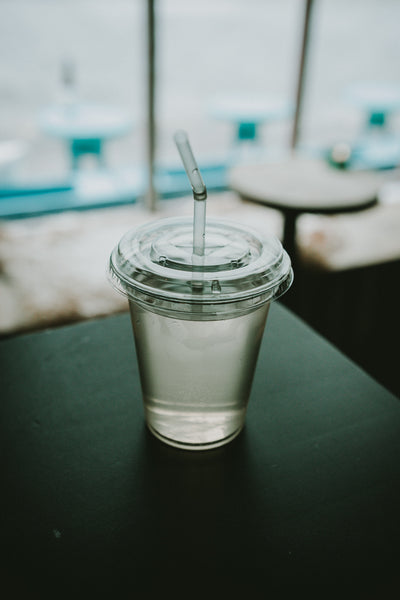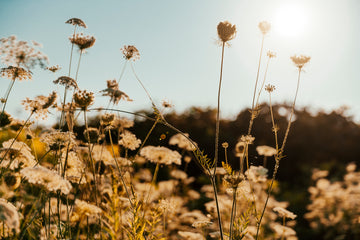10 Easy Ways to Go Plastic Free
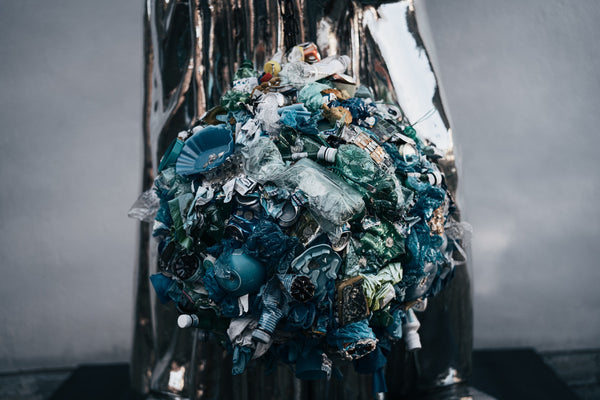
The overconsumption of plastic and the throwaway culture that has firmly lodged itself into the habits and lifestyle of the modern world around is, quite literally, rubbish! With fast fashion, mass consumerism and disposable products everywhere you look, compounded by busy lifestyles and lack of disposable income, it can be hard not to be sucked into the hedonistic ways of putting our own needs and wants before those of our planet.
But although it’s easy to fall into the traps that convenience sets for us, it really can be just as easy to take small steps towards snubbing disposable culture and embracing a more plastic-free way of life.
If your New Year’s resolution is to make your life more plastic-free, reject throwaway culture, or just take your first tentative steps into doing more for your environment, we’ve put together some tips that may help you on your journey. What’s more, most of these really can be easily woven into your everyday life…
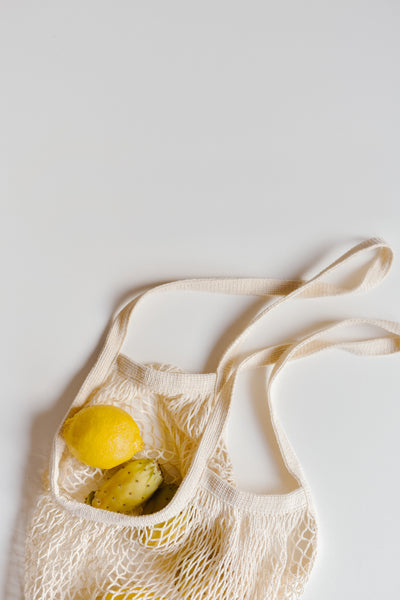
1. Invest in good reusable shopping bags…and use them!
We like to think we’re all pretty good at purchasing reusable shopping bags, and our intentions really are to use them, but we’re sure we’re not alone in finding ourselves at the till and realising we’ve left those bags at home! Having to buy more there and then sort of defeats the purpose doesn’t it? Let’s make it our most important goal to NOT forget them! Whether that means keeping them with you at all times by buying fold-up canvas bags that easily fit in your handbag, or going wild with the post-it notes all over the place to remind you not to leave the house without them…whatever works for you!
If you’re going to invest in anything, make it a couple of really good quality reusable bags! Purchase bags that are made from durable materials that will last, but which are also thin enough to fold down to carry easily. Go for something that matches your style, so you’ll feel happy and comfortable carrying them whether you’re in a discount store or a high-end boutique, and look out for ones with long handles so you can easily carry your shopping over your shoulder. Washable bags are also a great idea so you can continue to re-use them over and over again, with no crying over spilt milk!
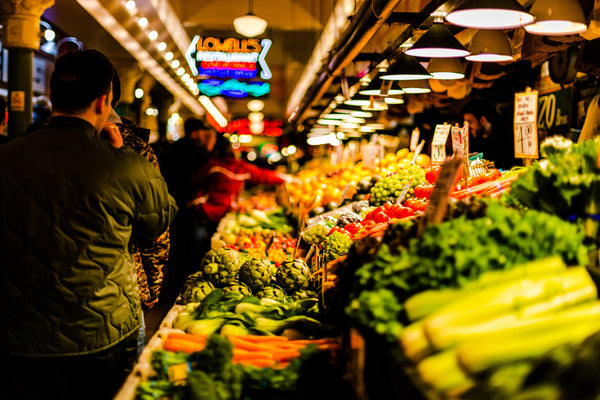
2. Make Farmer’s markets your “go-to” for fresh goods
One of the biggest lifestyle changes we can make is to make a few adjustments to the way we shop. A recent report showed that despite the magnifying glass that has been placed over supermarkets and their effect on the environment in recent years, the UK’s biggest supermarkets are still putting nearly 900,000 tonnes of plastic packaging on to the market each year! It’s not even decreasing, it’s actually getting worse.
By making Farmer’s markets your first choice for your fresh produce, you will be part of the growing numbers of people who are voting with their feet and trying to show supermarkets that they can’t continue to operate in such an unsustainable way.
Most farmer’s markets nowadays are fully signed up to the plastic-free movement, and the majority of produce at these markets will be container-free and even sticker-free. Farmer’s Markets are the environmental choice not just for their plastic-free ethos though. The goods on sale are not only likely to be more nutritious and varied, but they will have travelled a much shorter distance from their source, reducing the pollution impact of transporting fresh produce, and will have generally been grown using methods that minimise the impact on the earth. You’ll get a friendly face behind the stall who will know exactly how each item has been produced and the best seasons to get the best fruit and veg, and you might even be introduced to some new products you’ve never come across before.
3. Invest in a travel kit
When we’re out and about and faced with the temptations of convenience, it can be easy to fall into the habits of inadvertently perpetuating disposable culture by ordering a coffee in a cup to go or picking up a straw from the bar. One of the easiest changes you can make on your journey to a plastic-free lifestyle is to purchase a travel kit that will mean you’ll never again feel the need to use any of these environmental no-nos.
If you prefer to drink from a straw but cringe when you see a plastic straw being added to your drink at the bar, or know that the cardboard ones simply don’t cut it, then investing in a few reusable and washable straws can help more than you think. In the UK every year we use over 4.7 BILLION plastic straws, and although a ban on these ocean polluting nightmares is due to come into force, it may take a while for every establishment to comply. Fold up metal straws are great for popping in your bag along with your lippy and phone when you’re heading on a night out, and we can almost guarantee that at least one person will see you take it out when your drink arrives and think, “now that’s a good idea!”
If you can’t do without your coffee fixes throughout the day, then invest in a good travel mug. The majority of reputable cafes and coffee shops will be only too happy to fill your reusable mug with your favourite caffeinated treat, and some may even offer you a discount for doing so. If you often eat in fast food restaurants, airports or anywhere where plastic cutlery rears its head, then carry your own cutlery with you. Bamboo cutlery is a great alternative to plastic as its usually biodegradable and can be washed and reused time and time again. Why not pop the cutlery, along with a washable cloth napkin, inside your coffee mug so you never forget it! While you’re at it, you can pop your straw in there too, giving you your own little plastic-free survival kit!
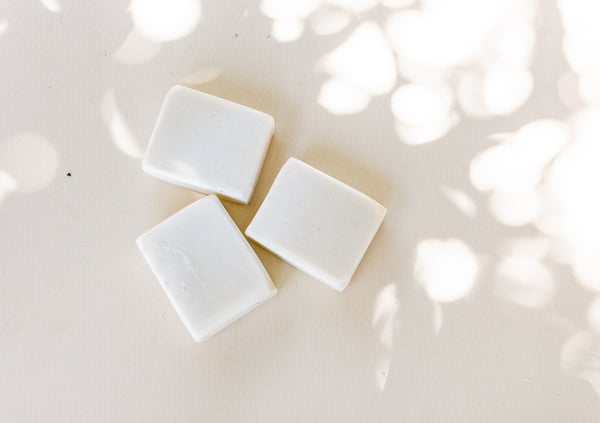
4. Don’t forget the bathroom
Some of the biggest culprits in terms of plastic usage in the home are toiletries such as our shampoos, soaps and lotions. Soap is an easy one to switch up, all we have to do is go back to how it used to be, using a bar of soap instead of the liquid soap a lot of us have become used to. And if you can, try to find bar soap with zero packaging, or at least packaging that is fully recyclable.
But what about things like shampoo and shower gel? Well, thanks to the global push towards a more plastic-free way of life, there are now numerous companies who provide plastic-free alternatives to bottled shampoos and body washes. Solid shampoo bars made from natural ingredients are becoming ever more popular, and even high street giants such as Lush are catching on to the trend with their own range of packaging free shower gel bars and shampoo bars. You could even go one step further and learn how to make your own shampoos, shower gels and lotions. That could be the Christmas presents for family and friends sorted for next year too!
Oh, and don’t forget to switch the plastic toothbrush for an alternative such as a bamboo toothbrush. There are even a number of plastic-free toothpastes on the market including “toothpaste bits” which are little tablets that come in a glass bottle and transform into toothpaste when you chew them. Another ingenious way that innovators across the world are making it easier for us all to change our daily habits for the better!
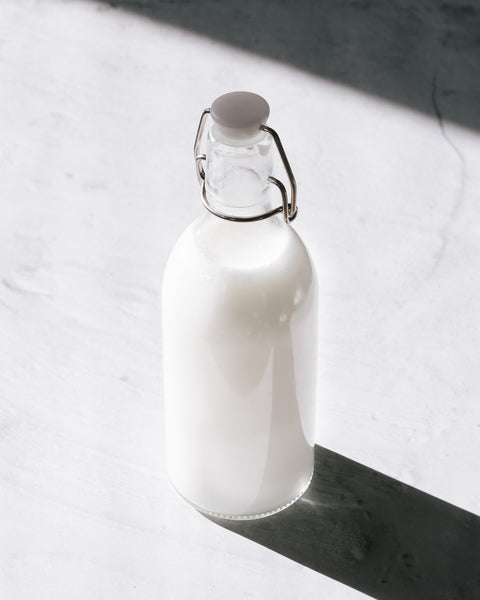
5. Bring back the milkman!
Ah the sound of the electric milk cart whirring down the street and the bottles clinking as the sun comes up. Takes you back to the “good ‘ol days” doesn’t it? Well, this one might be a bit trickier depending on where you live, but more and more companies are still providing milk in glass returnable bottles, going back to milk being delivered in bottles which can be reused, as opposed to plastic milk cartons from the supermarket. This site is great for finding your closest milk delivery service (https://www.findmeamilkman.net/). We recommend doing a bit of research and finding out which of the services closest to you deliver their milk in reusable/returnable glass and setting up a regular order with them. It may work out slightly more expensive than buying from the supermarkets, but it is so very worth it. The resurgence of glass bottle milk deliveries is one of the very best schemes out there to combat the “take-make-dispose” culture that is proving so harmful to our environment.
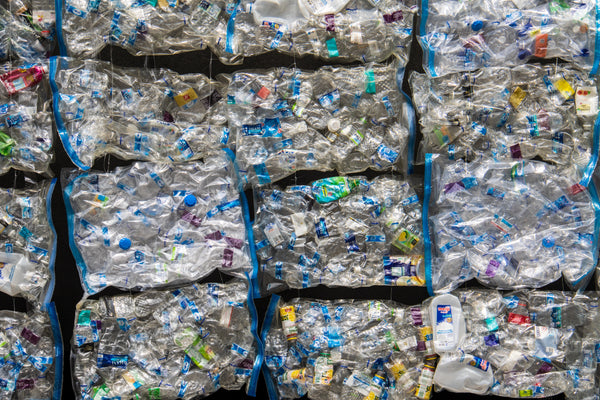
6. Say no to H2O (in plastic bottles!)
As with plastic milk bottles, plastic water bottles are one of the biggest drains on our environment, with over 80% of plastic water bottles ending up in landfills. Not only might there be potential health risks associated with drinking from plastic bottles, with overexposure to BPA and other toxins in plastics known to contribute to a host of cancers and liver and kidney problems, but their carbon footprint is simply saddening.
We recommend investing in a good re-usable water bottle, filling it up on the go and never having to pop into the shop for a bottle of water again. As well as helping to save the environment, you’ll be saving money too, up to £400 a year depending on which bottled water you’ve been buying!

7. Choose homewares and furnishings made from natural materials
With many plastics containing harmful additives that can actually contaminate the air in our houses, not to mention the harm associated with their production, we are on a mission to bring more natural, health-giving materials into our lives and homes. Not only do natural materials offer the style factor, they’re also the safest option for us and our families, being free from carcinogens and having been proven to offer mood-boosting qualities and clearer air.
Choosing natural materials in our homes can offer multi-sensory benefits – from their visual beauty to please the eye to their superior texture, feel and even smell. Furnishings made from sustainable natural materials also tend to be far more durable, are easier to repair (instead of having to replace), and when you have eventually outgrown them, they can be easily upcycled or recycled.
Small steps you can take include choosing utensils made from wood or even metals which are more likely to be recycled, storage boxes made from biodegradable natural materials such as seagrass and cotton, and trying to introduce more products such as glassware into your house.
As with most movements, the work starts at home!
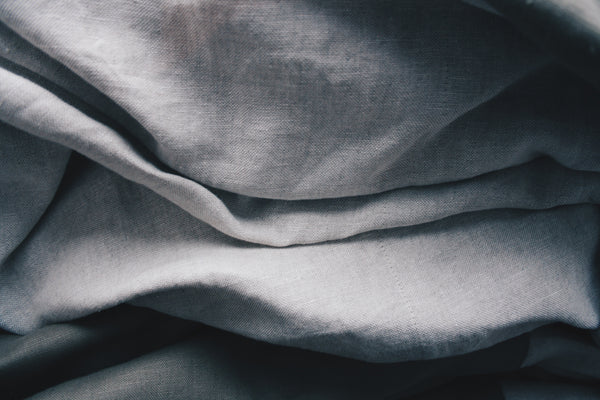
8. Go for quality over quantity
If you’re reading this blog post then you’ll probably already know that the throwaway culture and fast fashion trend seemingly embedded in our society is causing untold harm to our planet. The “buy cheap, buy twice” concept to both clothing and homewares seems to have somehow become ingrained in our purchasing habits and, quite frankly, it needs to stop. Thinking quality over quantity is the key. Invest in 1 good-quality outfit made from natural fibres that you can re-use multiple times, or scour the charity shops for a long-lasting bargain, rather than buying 5 low-quality items that will be thrown out when the arms start sagging or the material starts pilling after just a couple of washes.
When it comes to clothing, items made from natural fibres such as wool, silk, cotton, hemp and linen will always be of a much higher quality than those made from synthetic or plastic fabrics like nylon and polyester. Not only do synthetic fabrics require the use of numerous toxic chemicals, solvents and microplastics in their creation, but clothing made using natural fibres has a much higher level of durability and when looked after correctly can last for years.
Resist the temptation to throw all those cheap little knick-knacks into your trolley as you stroll round the shop, and instead save up to treat yourself to something that will proudly take its place in your home for years to come. We completely understand that the initial outlay of good quality products can be higher, and for many of us, not even an option. But if you can, then do. What’s more, the more we pay for something, the more we tend to look after it.

9. Gift Green
For birthdays and Christmas, why not consider gifting experiences instead of something material which may not even be used or wanted? We’re talking restaurant vouchers, tickets to an event, or even vouchers for streaming services instead of CDs, DVDs and books. You could even go further and donate to environmental charities instead, although we get that some people might not be too thrilled with this. Oh, and don’t forget to gently mention to your family and friends that you would rather not receive plastic gifts. Maybe even ask for something second-hand.

10. Become part of a plastic-free community
Like any change in lifestyle, be it small or dramatic, sometimes we need a little help to stay on track with our goals. And one of the best ways to do this is to surround yourself, or at least introduce yourself, to people with a similar mindset and goal in mind. There are multiple resources out there for people striving towards a plastic-free lifestyle including loads of forums and Facebook groups, such as this one which has over 32,000 active members, and pages like this one which offer tips that some of us might not have thought of yet. Have a look around to see which ones are the best fit for you and get involved.
Thankfully, more and more people are starting to realise the terrible effect that plastics are having on the fragile world around us, so you’re absolutely not alone on your quest for a plastic-free life! Let’s try and help the planet together, one step at a time.
Here at Mill & Willow, we spend our days searching for plastic-free alternatives for products in the home and would love to introduce you to some of the gems we’ve found. Why not take a look at some of the products on our website that may help you to introduce more pieces made from natural materials into your own home.
Sample Block Quote
Praesent vestibulum congue tellus at fringilla. Curabitur vitae semper sem, eu convallis est. Cras felis nunc commodo loremous convallis vitae interdum non nisl. Maecenas ac est sit amet augue pharetra convallis nec danos.
Sample Paragraph Text
Praesent vestibulum congue tellus at fringilla. Curabitur vitae semper sem, eu convallis est. Cras felis nunc commodo eu convallis vitae interdum non nisl. Maecenas ac est sit amet augue pharetra convallis nec danos dui.
Cras suscipit quam et turpis eleifend vitae malesuada magna congue. Damus id ullamcorper neque. Sed vitae mi a mi pretium aliquet ac sed elitos. Pellentesque nulla eros accumsan quis justo at tincidunt lobortis denimes loremous. Suspendisse vestibulum lectus in lectus volutpat, ut dapibus purus pulvinar. Vestibulum sit amet auctor ipsum.


